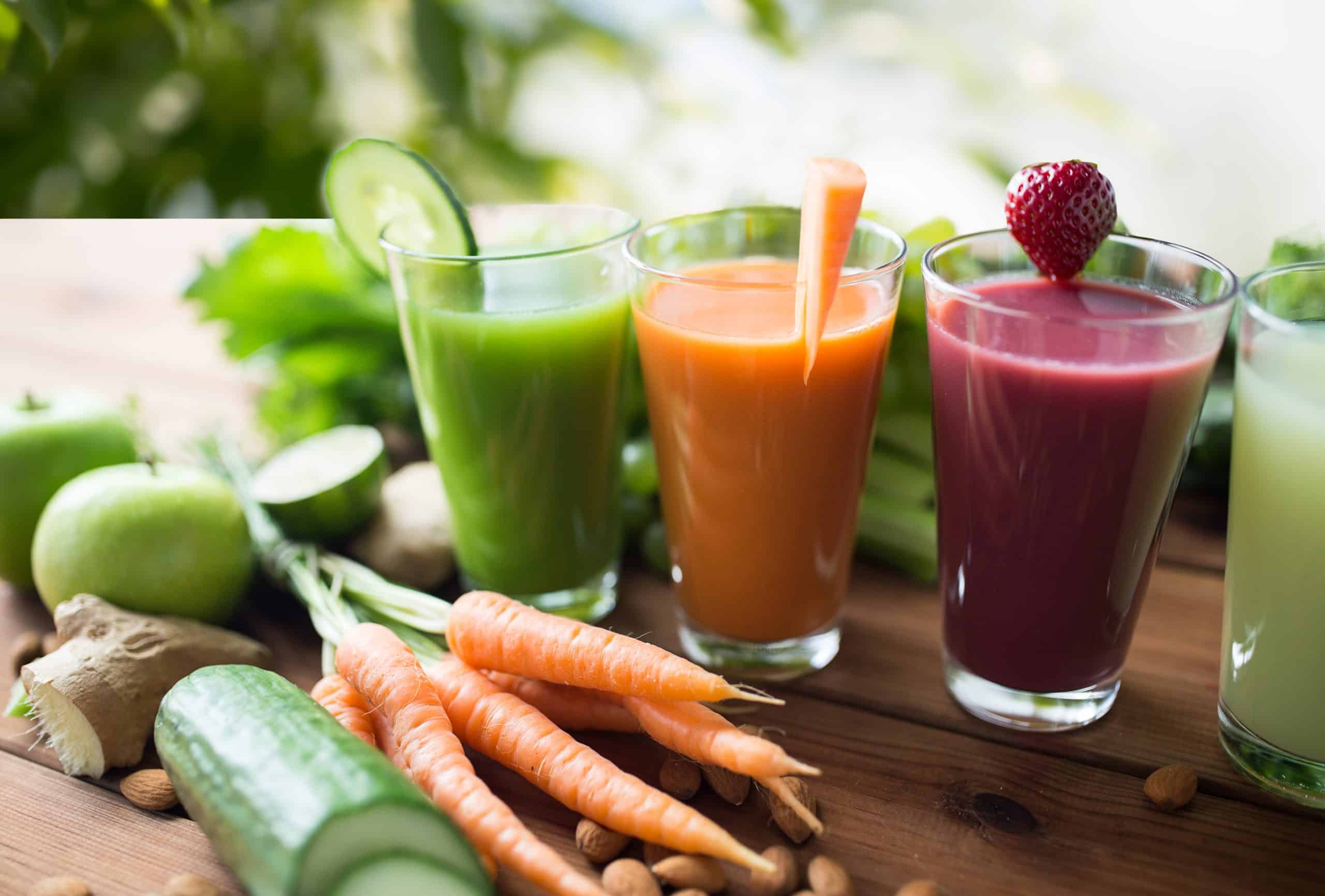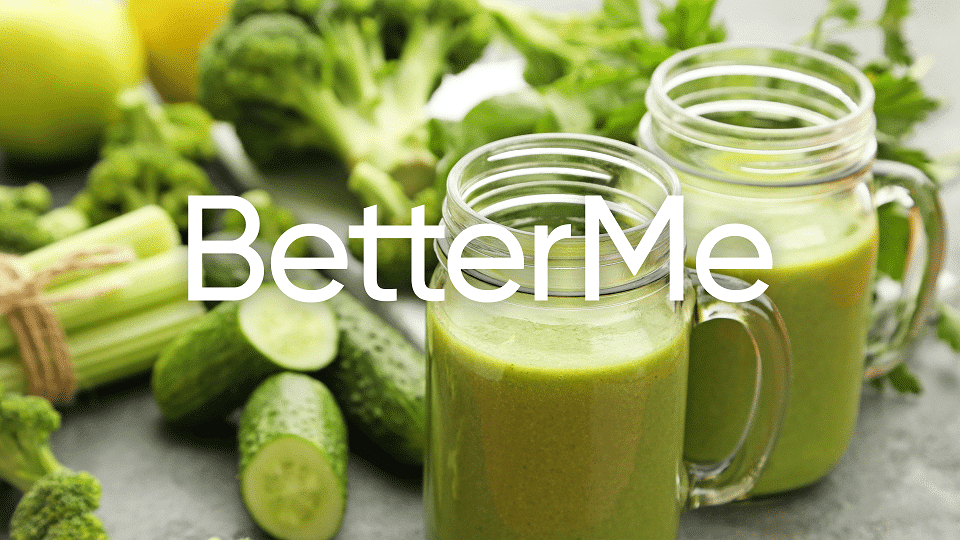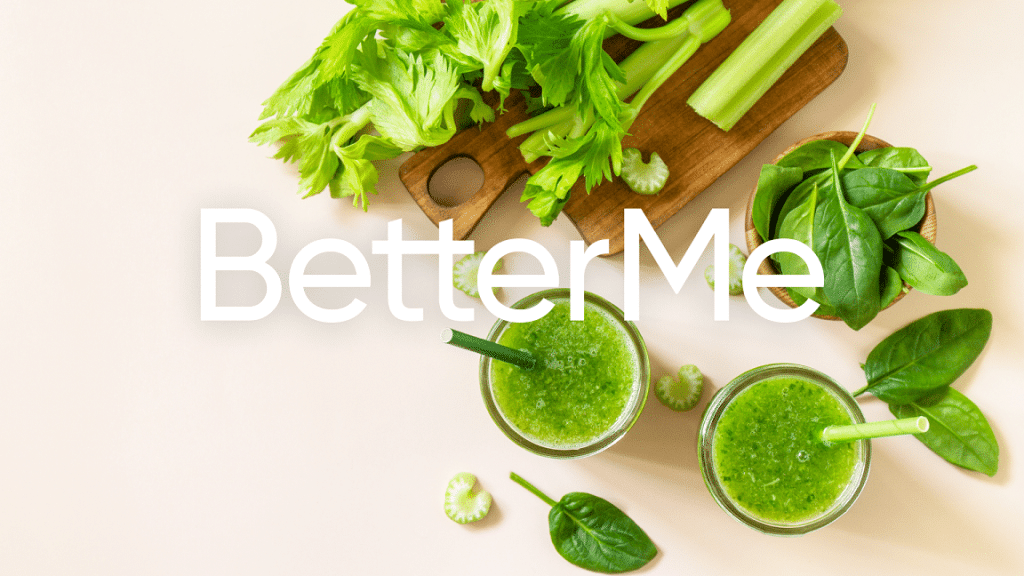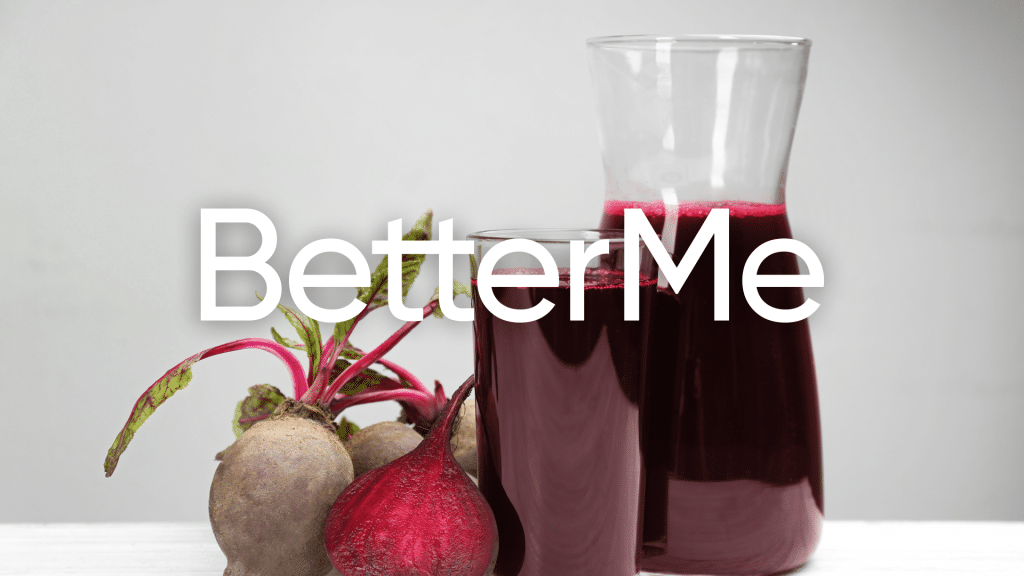It’s no secret that vegetables are essential for a healthy and balanced diet. They contain many essential vitamins, minerals, and other nutrients that are necessary for proper organ functioning. The United States Department of Agriculture (USDA) recommends consuming 2 to 3 cups of vegetables per day for adults, depending on one’s age and gender (2). However, according to the Centers for Disease Control and Prevention, only 9.3% of adults in the United States meet the daily vegetable intake recommendation (1). With such a significant gap in consumption, vegetable juices can be an efficient and delicious way to help many bridge this divide and make sure you’re getting the vegetable juice benefits you need.
Get your personalized
meal plan!
What Are Vegetable Juice Health Benefits?
Vegetable juice health benefits are numerous, as they provide a concentrated source of essential vitamins, minerals, and antioxidants that promote overall well-being.
Weight Loss
Vegetable juice can be a helpful tool in promoting weight loss, primarily due to its relatively low calorie content and high nutrient density.
Consuming vegetable juice in place of a high calorie snack in between meals can aid in lowering total calorie consumption. Furthermore, the high water content in vegetable juices can help increase feelings of fullness and satiety, which may result in lower food consumption.
Additionally, the vitamins, minerals, and antioxidants present in vegetable juices can support a healthy metabolism, making it easier for your body to burn calories efficiently.
While vegetable juice can contribute to weight loss, it should not replace whole vegetables or be the sole component of a weight loss plan. Consuming a balanced diet and engaging in regular physical activity are crucial components of a sustainable and effective weight loss strategy.
Also, be aware of added sugars in some commercial vegetable juices, as they can increase calorie content and negate some of the weight loss benefits.
Read More: Best Fruits To Juice For Health And Invigoration
Digestion
Vegetable juice can support healthy digestion in several ways, primarily due to its nutrient content and the presence of some fiber.
First, many vegetables contain vitamins and minerals that are essential for maintaining a healthy digestive system, such as magnesium, which aids in muscle function and helps regulate bowel movements (9).
Second, certain vegetable juices can provide a modest amount of fiber, especially if some pulp is included or if the juice is made using a blending method rather than traditional juicing.
Fiber is crucial for digestion, as it adds bulk to the stool, promotes regular bowel movements, and helps maintain a healthy balance of gut bacteria. Soluble fiber, in particular, can also help lower cholesterol levels and regulate blood sugar (10).
Additionally, some vegetables contain compounds that may have a positive impact on digestion. For example, ginger is known to have anti-inflammatory and antispasmodic properties that can help alleviate digestive discomfort and may improve overall gut function (16).
Although vegetable juice can contribute to better digestion, it should not replace whole vegetables in your diet. Whole vegetables contain much more fiber and a broader range of nutrients compared to their juiced counterparts.
To maximize the benefits of vegetable juice for digestion, opt for homemade juices or those with minimal added sugars and additives to ensure that you maintain a balanced diet rich in whole foods.
Skin
Vegetable juice can have a positive impact on skin health due to its rich content of essential vitamins, minerals, and antioxidants. Many vegetables contain nutrients such as vitamin A, vitamin C, and vitamin E, which play crucial roles in maintaining skin health (14).
Vitamin A helps promote skin cell regeneration and reduces the appearance of fine lines, while vitamin C aids in collagen production, which is vital for maintaining skin elasticity and firmness (14).
Vitamin E is an antioxidant that protects the skin from damage caused by free radicals and environmental stressors (14).
Additionally, the high water content in vegetable juices contributes to proper hydration, which is vital for maintaining healthy, glowing skin. Adequate hydration helps regulate oil production, prevents dryness, and supports the skin’s barrier function (14).
While vegetable juice can contribute to better skin health, it should be part of a holistic skincare routine that includes a well-balanced diet, proper hydration, and regular use of sunscreen and other skincare products.
Vegetable juice alone might not provide all the necessary nutrients for optimal skin health, so it’s essential to consume a variety of whole foods to get a comprehensive range of vitamins and minerals.
If you struggle to even flirt with the idea of giving up your favorite foods or working out till your legs give way – BetterMe app is here to breathe a fresh perspective into the way you view the weight loss process! Check out the app and experience the fun side of fitness and dieting with BetterMe!
Blood Sugar Control
Vegetable juice can help with blood sugar control, particularly when made from non-starchy vegetables such as leafy greens, cucumbers, and celery. These juices have a lower glycemic index, which means they cause a slower and more gradual rise in blood sugar levels compared to high-glycemic index beverages. However, the juices still have a higher glycemic index than the whole vegetables.
This is because the fiber present in vegetables and some vegetable juices can aid in blood sugar regulation by slowing down carbohydrate absorption and preventing elevated blood sugar (10).
However, it’s essential to be aware of added sugars in some commercial vegetable juices, as these can negate the blood sugar control benefits. Select homemade vegetable juices or those with no added sugars to maximize potential benefits.
Brain Health
Vegetable juice can support brain health due to its rich content of essential vitamins, minerals, and antioxidants. Nutrients like vitamin K, folate, and antioxidants found in many vegetables play crucial roles in cognitive function and overall brain health (7).
For example, vitamin K may be associated with improved memory and cognitive function, while folate helps maintain proper brain function by being necessary for the synthesis of neurotransmitters and potentially reducing inflammation (17).
The antioxidants present in vegetables can also protect brain cells from oxidative stress and damage, which may reduce the risk of age-related cognitive decline and neurodegenerative diseases (7).
Heart Health
Vegetable juice can support heart health from its content of essential nutrients like potassium, magnesium, and antioxidants.
Potassium helps regulate blood pressure by counteracting the effects of sodium, while magnesium supports healthy blood flow and overall cardiovascular function (5).
Antioxidants found in vegetables can help protect the heart and blood vessels from oxidative damage, which may reduce the risk of developing heart disease (5).
Moreover, some vegetable juices can provide a modest amount of soluble fiber, which can help lower cholesterol levels by binding to cholesterol particles in the digestive system and removing them from the body (5).
Reduced Inflammation
Many vegetables contain compounds with anti-inflammatory properties, such as flavonoids and carotenoids. These compounds can help combat inflammation in the body by neutralizing harmful free radicals and reducing the production of pro-inflammatory cytokines (12).
Some examples of vegetables with strong anti-inflammatory properties include leafy greens, beets, and ginger.
Incorporating these vegetables into your juices might help manage inflammation and potentially reduce the risk of chronic diseases associated with long-term inflammation (12).
Read More: 8 Orange Juice Benefits That Will Make It A Staple At Your Breakfast Table
Immune System Support
Vegetable juice is rich in vitamins, minerals, and antioxidants that play crucial roles in supporting a healthy immune system. Vitamins A, C, and E, as well as minerals like zinc and selenium, are vital for maintaining proper immune function and protecting the body against infections (8).
Additionally, the antioxidants present in many vegetables can help protect immune cells from oxidative damage, further enhancing their ability to fight off pathogens and maintain overall health (8).
Increased Energy Levels
One of the benefits of vegetable juice in the morning is it gives a good energy boost. The nutrient-dense nature of vegetable juice provides essential vitamins and minerals that contribute to sustained energy throughout the day.
B vitamins, in particular, play a critical role in converting the food we eat into energy our body can use. Many vegetables are rich in various B vitamins, which can help maintain stable energy levels and prevent fatigue (18).
What Is The Healthiest Vegetable Juice To Drink?
The healthiest vegetable juice to drink is one that is made from a variety of nutrient-dense, non-starchy vegetables and contains minimal added sugars and additives. Some of the best vegetables to include in a healthy juice are:
Leafy Greens
Kale, spinach, collard greens, and Swiss chard are all rich in vitamins A, C, and K, as well as minerals like calcium and iron. They also have high levels of antioxidants and phytonutrients that support overall health (13).
Cruciferous Vegetables
Broccoli, cauliflower, cabbage, and Brussels sprouts are packed with nutrients and contain compounds like sulforaphane, which has been shown to have anti-cancer properties and may provide other health benefits (3).
Root Vegetables
Beets and carrots are excellent sources of vitamins and minerals, as well as antioxidants like betalains and beta-carotene, which support heart and eye health (15).
Herbs And Spices
Adding herbs like parsley, cilantro, or mint can provide additional flavor and nutrients, while spices like ginger and turmeric offer anti-inflammatory and digestive benefits (11).
Low-Sugar Fruits
If you want to add a touch of natural sweetness to your vegetable juice, consider using low-sugar fruits like green apples, lemons, or limes.
To maximize your vegetable juice recipes and benefits, it’s essential to use a variety of these ingredients and avoid relying solely on one type of vegetable. In this way you’ll be getting a diverse range of nutrients and taking advantage of the unique benefits each vegetable offers.
Whether you’re a workout beast or just a beginner making your first foray into the world of fitness and dieting – BetterMe has a lot to offer to both newbies and experts! Install the app and experience the versatility first-hand!
Is It Good To Drink Vegetable Juice Every Day?
Drinking vegetable juice every day can be a healthy addition to your diet, as it provides essential vitamins, minerals, and antioxidants that support overall health.
Consuming vegetable juice daily can help you reach the recommended daily servings of vegetables, which many people struggle to achieve through whole foods alone.
However, there are a few considerations to keep in mind when incorporating vegetable juice into your daily routine:
Balance With Whole Foods
Vegetable juice should not replace whole vegetables in your diet. Whole vegetables contain more fiber and a broader range of nutrients compared to their juiced counterparts. Make sure to consume a variety of whole fruits and vegetables alongside vegetable juice for optimal nutrition.
Watch Out For Added Sugars And Additives
Some commercial vegetable juices contain added sugars and other additives, which can negate some of the health benefits. Select homemade vegetable juices or those with minimal added sugars and additives to maximize potential benefits.
Portion Control
While vegetable juice is nutrient-dense, it’s essential to be mindful of portion sizes. Drinking large quantities of juice can contribute to excessive calorie intake, especially if the juice contains higher-calorie ingredients like fruit or starchy vegetables.
Variety
To be sure you’re getting a wide range of nutrients, try to rotate the types of vegetables you include in your juices. This will help you consume different vitamins, minerals, and phytonutrients that various vegetables offer.
Is It Safe To Drink Raw Vegetable Juice?
Drinking raw vegetable juice can be safe and beneficial for most people, as it provides essential vitamins, minerals, and antioxidants. However, there are some potential risks and precautions to consider when consuming raw vegetable juice:
Foodborne Illness
Raw vegetables can sometimes carry harmful bacteria like E. coli, Salmonella, or Listeria, which can cause foodborne illnesses (6). To minimize this risk, always wash your vegetables thoroughly before juicing, and consider using a produce wash for added safety.
Also, store your juice properly in the refrigerator and consume it within 24-48 hours to reduce the risk of bacterial growth.
Pesticide Residues
Pesticides used in conventional agriculture can leave residues on vegetables, which may end up in your juice. To minimize exposure to pesticides, choose organic vegetables whenever possible and wash them thoroughly before juicing.
Oxalates
Some vegetables, like spinach and beet greens, contain high levels of oxalates, which can contribute to kidney stones in susceptible individuals (4).
If you have a history of kidney stones or have been advised to follow a low-oxalate diet, limit your consumption of high-oxalate vegetables in your juices.
Allergies And Sensitivities
Some people may have allergies or sensitivities to certain vegetables. If you’re aware of any food allergies or intolerances, avoid including those vegetables in your juice.
Frequently Asked Questions
What Are The Mental Health Benefits Of Vegetable Juice?
Vegetable juice can support mental health by providing essential nutrients like vitamins, minerals, and antioxidants that play crucial roles in cognitive function and overall brain health (7).
For example, vitamins K and folate found in many vegetables help maintain proper brain function, regulate neurotransmitters, and reduce inflammation (7).
Additionally, antioxidants in vegetables protect brain cells from oxidative stress, which may help reduce the risk of age-related cognitive decline and neurodegenerative diseases (7).
Is 100% Vegetable Juice Good For You?
Yes, 100% vegetable juice can be good for you, as it provides a concentrated source of essential nutrients like vitamins, minerals, and antioxidants that support overall health.
However, it’s important to consume vegetable juice as part of a balanced diet alongside whole foods to ensure optimal nutrition.
Be mindful of added sugars and other additives in commercial vegetable juices, and rather prefer homemade vegetable juices or those with minimal added sugars and additives to maximize potential benefits.
Which Vegetable Juice Is Best For Weight Loss?
The best vegetable juice for weight loss is one made from nutrient-dense, low-calorie, and non-starchy vegetables such as leafy greens, cucumbers, celery, and bell peppers.
These juices are lower in calories and have a lower glycemic index, which means they have a lesser impact on blood sugar levels as compared to high-glycemic beverages.
When consumed as part of a balanced diet and combined with regular physical activity, vegetable juice can contribute to healthy weight loss.
However, it’s essential to practice portion control and avoid vegetable juices with added sugars and additives that can hinder weight loss efforts.
The Bottom Line
Vegetable juice can be a healthy addition to your diet, providing essential vitamins, minerals, and antioxidants that support overall health, including mental health, heart health, and immune function. It should not replace whole vegetables in your diet, however. Drinking vegetable juice can also contribute to weight loss when consumed as part of a balanced diet and combined with regular physical activity.
DISCLAIMER:
This article is intended for general informational purposes only and does not serve to address individual circumstances. It is not a substitute for professional advice or help and should not be relied on for making any kind of decision-making. Any action taken as a direct or indirect result of the information in this article is entirely at your own risk and is your sole responsibility.
BetterMe, its content staff, and its medical advisors accept no responsibility for inaccuracies, errors, misstatements, inconsistencies, or omissions and specifically disclaim any liability, loss or risk, personal, professional or otherwise, which may be incurred as a consequence, directly or indirectly, of the use and/or application of any content.
You should always seek the advice of your physician or other qualified health provider with any questions you may have regarding a medical condition or your specific situation. Never disregard professional medical advice or delay seeking it because of BetterMe content. If you suspect or think you may have a medical emergency, call your doctor.
SOURCES:
- Adults Meeting Fruit and Vegetable Intake Recommendations — United States, 2019 (2022, cdc.gov)
- Americans Still Can Meet Fruit and Vegetable Dietary Guidelines for $2.10-$2.60 per Day (2019, usda.gov)
- Cruciferous Vegetables and Their Bioactive Metabolites: from Prevention to Novel Therapies of Colorectal Cancer (2022, nih.gov)
- Dietary oxalate and kidney stone formation (2018, nih.gov)
- Effects of Vegetables on Cardiovascular Diseases and Related Mechanisms (2017, nih.gov)
- Food safety (2022, who.int)
- Foods linked to better brainpower (2021, harvard.edu)
- Foods to deliver immune-supporting nutrients (2021, nih.gov)
- Fruit and vegetables (n.d., nidirect.gov.uk)
- Health benefit of vegetable/fruit juice-based diet: Role of microbiome (2017, nih.gov)
- Health Benefits of Culinary Herbs and Spices (2019, pubmed.gov)
- Health Benefits of Fruits and Vegetables (2012, nih.gov)
- Nutrients and bioactives in green leafy vegetables and cognitive decline (2018, nih.gov)
- Plant-Based Foods for Skin Health: A Narrative Review (2021, jandonline.org)
- Root Vegetables—Composition, Health Effects, and Contaminants (2022, nih.gov)
- The Amazing and Mighty Ginger (2011, nih.gov)
- The Relationships Between Vitamin K and Cognition: A Review of Current Evidence (2019, nih.gov)
- Vitamins and Minerals for Energy, Fatigue and Cognition: A Narrative Review of the Biochemical and Clinical Evidence (2020, nih.gov)














